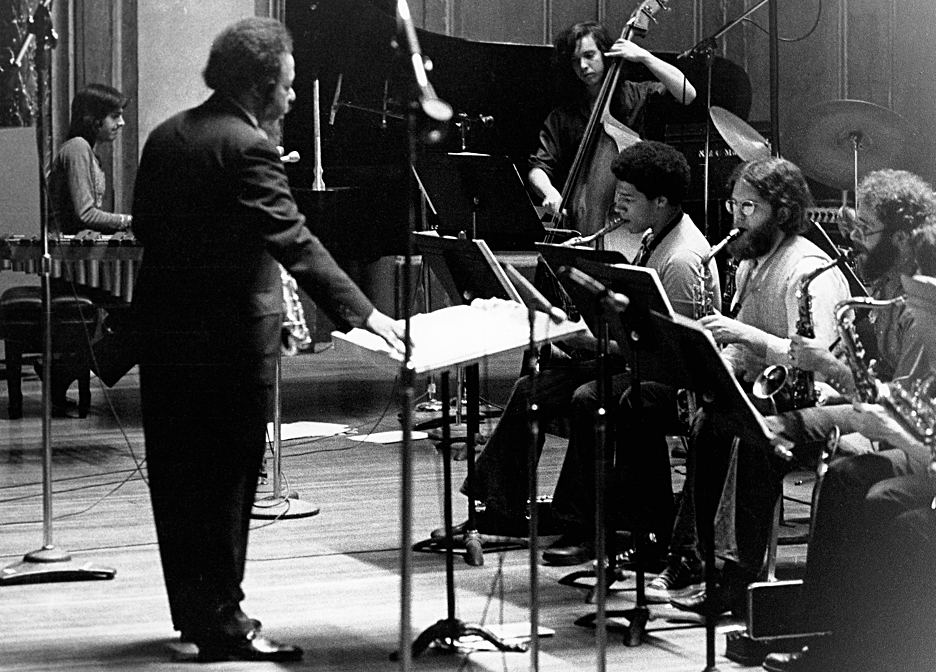The Music of Jaki Byard" concert will highlight the multi-instrumentalist, composer and arranger’s big band repertoire and his legacy at NEC World premiere of new work by composer Carl Atkins written in honor of Byard.
International broadcast on Saturday, April 9
The NEC Jazz Orchestra under the direction of Ken Schaphorst celebrates the centennial of Jaki Byard in a live concert on Thursday, March 3, 2022 at 7:30 p.m. at Jordan Hall, 290 Huntington Avenue, Boston. Byard was one of the cornerstones of the groundbreaking Afro-American Music and Jazz Studies Department assembled by Carl Atkins and Gunther Schuller at NEC in 1969. The Music of Jaki Byard features repertoire from Byard’s Apollo Stompers, including “Aluminum Baby,” “Spanish Tinge” and “Up Jumps One.” In addition, founding NEC Jazz Studies Department Chair Carl Atkins will conduct the world premiere of his piece in two movements, “Jaki Stomps" and “Blues for Wor-chester,” written in honor of Byard. Joining the orchestra are special guests: pianist and NEC faculty member Jason Moran, who studied with Byard in NYC, and saxophonist Jed Levy, an NEC alum who was mentored by Byard. Admission is free and open to the public. For information visit necmusic.edu. The concert will be recorded and broadcast internationally on Saturday, April 9 on the NEC website.
Also on March 3, Jaki Byard’s 100th Birthday Panel Discussion will be held at 1 p.m. at NEC’s Williams Hall. The panel will feature Schaphorst along with Carl Atkins, Jason Moran, and two NEC alumni who studied with Byard: Jed Levy, and trumpeter/educator Ingrid Monson. They will discuss Byard’s life and ongoing musical legacy both at NEC and in the larger jazz community.
Jaki Byard was born in Worcester, Massachusetts in 1922, and grew up in a musical family. As a child he took in live performances by artists including Fats Waller, Chick Webb with Ella Fitzgerald, the Benny Goodman Quartet, Lionel Hampton, and Gene Krupa, and listened to radio broadcasts featuring the big bands of Ellington, Basie, Benny Carter, and others. After being discharged from the army in 1945, he settled in Boston and was quickly absorbed into the music scene. By the late 1940s, he had worked with the likes of Sam Rivers, Ray Nance, and Earl Bostic. In 1955 he joined Herb Pomeroy’s band as a tenor saxophonist, and began composing and arranging music for the ensemble. An eventual return to solo piano playing and a move to New York City prompted the recording of his first solo album, Blues for Smoke, in 1960. Shortly thereafter he began his association with Charles Mingus, an important and lasting influence. He also performed and recorded with Eric Dolphy and many others. He joined the faculty of New England Conservatory in 1969 when the Jazz Studies Department was started in 1969 and taught there until 1977.
The Apollo Stompers, a big band comprised of Byard’s students, was formed in the mid-1970s. He later put together another band by the same name featuring musicians he knew in New York City. He was honored in 1995 during the 100th anniversary of Harlem Week for his work with the Apollo Stompers. He died in 1999.
A founding member of the Boston-based Jazz Composers Alliance, trumpeter and composer Ken Schaphorst has been awarded composition fellowships from the National Endowment for the Arts, the Massachusetts Cultural Council, the Wisconsin Arts Board, and Meet the Composer. Created in 1989, the Ken Schaphorst Big Band has featured notable performers including John Medeski, Uri Caine, Drew Gress, Donny McCaslin, and Seamus Blake. Schaphorst has released several albums as a leader, including the 2016 release by the Ken Schaphorst Big Band, How to Say Goodbye. Since becoming chair of the NEC Jazz Studies department in 2001, Schaphorst has directed the NEC Jazz Orchestra in new music and traditional big band repertoire. Under his direction, the ensemble has won critical acclaim for its recordings and performances throughout the country, as well as being named Best College Big Band in the 2004 DownBeat Student Music Awards. Schaphorst also founded NEC’s Youth Jazz Orchestra in 2008.
The first fully accredited jazz studies program at a music conservatory, NEC’s Jazz Studies Department was the brainchild of Gunther Schuller, who moved quickly to incorporate jazz into the curriculum when he became president of the Conservatory in 1967. Schuller hired Carl Atkins to head the department, as well as George Russell, Jaki Byard and Ran Blake. Among the “most acclaimed and successful in the world” (JazzTimes), the program has spawned numerous Grammy winning composers and performers and has an alumni list that reads like a who's who of jazz, while the faculty has included six MacArthur “genius" grant recipients (three currently teaching) and four NEA Jazz Masters. The foundation of its teaching and success begins with the mentor relationship developed in lessons between students and the prominent faculty artists. In addition to its two jazz orchestras, faculty-coached small ensembles reflect NEC’s inclusive approach to music making, with groups focused on free jazz, early jazz, gospel music, Brazilian music, and songwriting, as well as more traditional approaches to jazz performance. Each jazz student is encouraged to find their own musical voice while making connections and collaborating with a vibrant community of creative musicians, and ultimately to transform the world through the power of music.
Photo Credits Jaki Byard, Jordan Hall: Alan Pasqua, piano; Edwin (Ed) Schuller, bass; Ricky Ford, Ross Bauer, Lance VanLenten, saxophones (L-R)
International broadcast on Saturday, April 9
The NEC Jazz Orchestra under the direction of Ken Schaphorst celebrates the centennial of Jaki Byard in a live concert on Thursday, March 3, 2022 at 7:30 p.m. at Jordan Hall, 290 Huntington Avenue, Boston. Byard was one of the cornerstones of the groundbreaking Afro-American Music and Jazz Studies Department assembled by Carl Atkins and Gunther Schuller at NEC in 1969. The Music of Jaki Byard features repertoire from Byard’s Apollo Stompers, including “Aluminum Baby,” “Spanish Tinge” and “Up Jumps One.” In addition, founding NEC Jazz Studies Department Chair Carl Atkins will conduct the world premiere of his piece in two movements, “Jaki Stomps" and “Blues for Wor-chester,” written in honor of Byard. Joining the orchestra are special guests: pianist and NEC faculty member Jason Moran, who studied with Byard in NYC, and saxophonist Jed Levy, an NEC alum who was mentored by Byard. Admission is free and open to the public. For information visit necmusic.edu. The concert will be recorded and broadcast internationally on Saturday, April 9 on the NEC website.
Also on March 3, Jaki Byard’s 100th Birthday Panel Discussion will be held at 1 p.m. at NEC’s Williams Hall. The panel will feature Schaphorst along with Carl Atkins, Jason Moran, and two NEC alumni who studied with Byard: Jed Levy, and trumpeter/educator Ingrid Monson. They will discuss Byard’s life and ongoing musical legacy both at NEC and in the larger jazz community.
Jaki Byard was born in Worcester, Massachusetts in 1922, and grew up in a musical family. As a child he took in live performances by artists including Fats Waller, Chick Webb with Ella Fitzgerald, the Benny Goodman Quartet, Lionel Hampton, and Gene Krupa, and listened to radio broadcasts featuring the big bands of Ellington, Basie, Benny Carter, and others. After being discharged from the army in 1945, he settled in Boston and was quickly absorbed into the music scene. By the late 1940s, he had worked with the likes of Sam Rivers, Ray Nance, and Earl Bostic. In 1955 he joined Herb Pomeroy’s band as a tenor saxophonist, and began composing and arranging music for the ensemble. An eventual return to solo piano playing and a move to New York City prompted the recording of his first solo album, Blues for Smoke, in 1960. Shortly thereafter he began his association with Charles Mingus, an important and lasting influence. He also performed and recorded with Eric Dolphy and many others. He joined the faculty of New England Conservatory in 1969 when the Jazz Studies Department was started in 1969 and taught there until 1977.
The Apollo Stompers, a big band comprised of Byard’s students, was formed in the mid-1970s. He later put together another band by the same name featuring musicians he knew in New York City. He was honored in 1995 during the 100th anniversary of Harlem Week for his work with the Apollo Stompers. He died in 1999.
A founding member of the Boston-based Jazz Composers Alliance, trumpeter and composer Ken Schaphorst has been awarded composition fellowships from the National Endowment for the Arts, the Massachusetts Cultural Council, the Wisconsin Arts Board, and Meet the Composer. Created in 1989, the Ken Schaphorst Big Band has featured notable performers including John Medeski, Uri Caine, Drew Gress, Donny McCaslin, and Seamus Blake. Schaphorst has released several albums as a leader, including the 2016 release by the Ken Schaphorst Big Band, How to Say Goodbye. Since becoming chair of the NEC Jazz Studies department in 2001, Schaphorst has directed the NEC Jazz Orchestra in new music and traditional big band repertoire. Under his direction, the ensemble has won critical acclaim for its recordings and performances throughout the country, as well as being named Best College Big Band in the 2004 DownBeat Student Music Awards. Schaphorst also founded NEC’s Youth Jazz Orchestra in 2008.
The first fully accredited jazz studies program at a music conservatory, NEC’s Jazz Studies Department was the brainchild of Gunther Schuller, who moved quickly to incorporate jazz into the curriculum when he became president of the Conservatory in 1967. Schuller hired Carl Atkins to head the department, as well as George Russell, Jaki Byard and Ran Blake. Among the “most acclaimed and successful in the world” (JazzTimes), the program has spawned numerous Grammy winning composers and performers and has an alumni list that reads like a who's who of jazz, while the faculty has included six MacArthur “genius" grant recipients (three currently teaching) and four NEA Jazz Masters. The foundation of its teaching and success begins with the mentor relationship developed in lessons between students and the prominent faculty artists. In addition to its two jazz orchestras, faculty-coached small ensembles reflect NEC’s inclusive approach to music making, with groups focused on free jazz, early jazz, gospel music, Brazilian music, and songwriting, as well as more traditional approaches to jazz performance. Each jazz student is encouraged to find their own musical voice while making connections and collaborating with a vibrant community of creative musicians, and ultimately to transform the world through the power of music.
About New England Conservatory
New England Conservatory (NEC) is recognized internationally as a leader among music schools, educating and training musicians of all ages from around the world for over 150 years. With 800 music students representing more than 40 countries in the College, and 2,000 youth and adults who study in the Preparatory and Continuing Education divisions, NEC cultivates a diverse, dynamic community for students, providing them with performance opportunities and high-caliber training with internationally esteemed artist-teachers and scholars. NEC’s alumni, faculty and students touch nearly every aspect of musical life in the region; NEC is a major engine of the vital activity that makes Boston a musical and cultural capital.Photo Credits Jaki Byard, Jordan Hall: Alan Pasqua, piano; Edwin (Ed) Schuller, bass; Ricky Ford, Ross Bauer, Lance VanLenten, saxophones (L-R)
Visit Website | Purchase Tickets
For more information contact Braithwaite & Katz Communications.





























